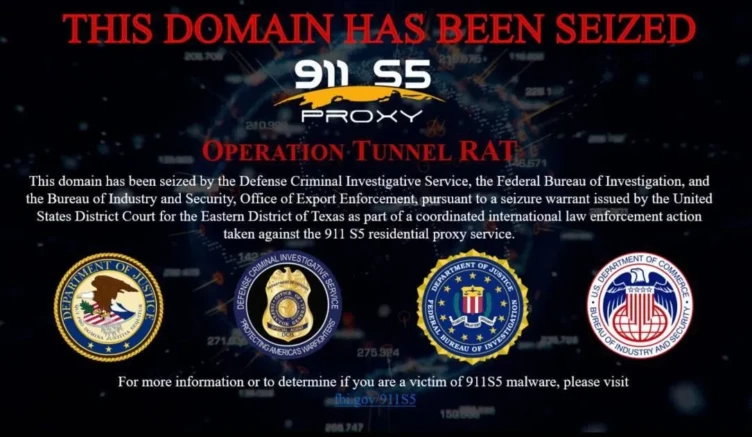911 S5 Botnet Dismantled – Another Major Botnet Taken Down
Law Enforcement Takes Down Another Major Cybercrime Operation
Primary Category: Law Enforcement
Authors:
• SCARS Editorial Team – Society of Citizens Against Relationship Scams Inc.
• U.S. Federal Bureau of Investigation
About This Article
In a significant international law enforcement operation led by the U.S. Justice Department, the notorious 911 S5 botnet, responsible for infecting over 19 million IP addresses and facilitating large-scale fraud and other crimes, has been dismantled.
The operation resulted in the arrest of YunHe Wang, a Chinese national, who allegedly created and operated the botnet from 2014 to 2022. Wang’s malware compromised millions of residential computers, allowing cybercriminals to commit various offenses, including financial fraud and child exploitation.
The takedown highlights the global collaboration needed to combat sophisticated cybercriminal enterprises and underscores the severe consequences of such illicit activities.

U.S. FBI and Law Enforcement Partners: 911 S5 Botnet Dismantled and Its Administrator Arrested in Coordinated International Operation
Botnet Infected Over 19M IP Addresses to Enable Billions of Dollars in Pandemic and Unemployment Fraud, and Access to Child Exploitation Materials taken down by Law Enforcement!
A court-authorized international law enforcement operation led by the U.S. Justice Department disrupted a botnet used to commit cyber attacks, large-scale fraud, child exploitation, harassment, bomb threats, and export violations.
As part of this operation, YunHe Wang, 35, a People’s Republic of China national and St. Kitts and Nevis citizen-by-investment, was arrested on May 24 on criminal charges arising from his deployment of malware and the creation and operation of a residential proxy service known as “911 S5.”
According to an indictment unsealed on May 24, from 2014 through July 2022, Wang and others are alleged to have created and disseminated malware to compromise and amass a network of millions of residential Windows computers worldwide. These devices were associated with more than 19 million unique IP addresses, including 613,841 IP addresses located in the United States. Wang then generated millions of dollars by offering cybercriminals access to these infected IP addresses for a fee.
“This Justice Department-led operation brought together law enforcement partners from around the globe to disrupt 911 S5, a botnet that facilitated cyber-attacks, large-scale fraud, child exploitation, harassment, bomb threats, and export violations,” said Attorney General Merrick B. Garland. “As a result of this operation, YunHe Wang was arrested on charges that he created and operated the botnet and deployed malware. This case makes clear that the long arm of the law stretches across borders and into the deepest shadows of the dark web, and the Justice Department will never stop fighting to hold cybercriminals to account.”
“Working with our international partners, the FBI conducted a joint, sequenced cyber operation to dismantle the 911 S5 Botnet—likely the world’s largest botnet ever,” said FBI Director Christopher Wray. “We arrested its administrator, Yunhe Wang, seized infrastructure and assets, and levied sanctions against Wang and his co-conspirators. The 911 S5 Botnet infected computers in nearly 200 countries and facilitated a whole host of computer-enabled crimes, including financial frauds, identity theft, and child exploitation. This operation demonstrates the FBI’s commitment to working shoulder-to-shoulder with our partners to protect American businesses and the American people, and we will work tirelessly to unmask and arrest the cybercriminals who profit from this illegal activity.”
According to court documents, Wang allegedly propagated his malware through Virtual Private Network (VPN) programs, such as MaskVPN and DewVPN (torrent distribution models that he operated) and pay-per-install services that bundled his malware with other program files, including pirated versions of licensed software or copyrighted materials. Wang then managed and controlled approximately 150 dedicated servers worldwide, approximately 76 of which he leased from U.S. based online service providers. Using the dedicated servers, Wang deployed and managed applications, commanded and controlled the infected devices, operated his 911 S5 service, and provided paying customers with access to proxied IP addresses associated with the infected devices.
“As alleged in the indictment, Wang created malware that compromised millions of residential computers around the world and then sold access to the infected computers to cybercriminals,” said Principal Deputy Assistant Attorney General Nicole M. Argentieri, head of the Justice Department’s Criminal Division. “These criminals used the hijacked computers to conceal their identities and commit a host of crimes, from fraud to cyberstalking. Cybercriminals should take note. Today’s announcement sends a clear message that the Criminal Division and its law enforcement partners are firm in their resolve to disrupt the most technologically sophisticated criminal tools and hold wrongdoers to account.”
“YunHe Wang created and administered a residential proxy service—a botnet known as 911 S5—that affected millions of computers all over the world,” said U.S. Attorney Damien M. Diggs for the Eastern District of Texas. “He will now be held accountable. Proxy services like 911 S5 are pervasive threats that shield criminals behind the compromised IP addresses of residential computers worldwide. Successfully tackling a problem of this scale is only possible with strong collaboration and exceptional investigative work between our law enforcement partners at home and abroad, and we stand ready to hold accountable anyone—no matter where they are located—who exploits our telecommunications infrastructure for their own criminal purpose.”
Cybercriminals then used proxied IP addresses purchased from 911 S5 to conceal their true originating IP addresses and locations, and anonymously commit a wide array of offenses. These offenses including financial crimes, stalking, transmitting bomb threats and threats of harm, illegal exportation of goods, and receiving and sending child exploitation materials. Since 2014, 911 S5 allegedly enabled cybercriminals to bypass financial fraud detection systems and steal billions of dollars from financial institutions, credit card issuers, and federal lending programs.
911 S5 customers allegedly targeted certain pandemic relief programs. For example, the United States estimates that 560,000 fraudulent unemployment insurance claims originated from compromised IP addresses, resulting in a confirmed fraudulent loss exceeding $5.9 billion. Additionally, in evaluating suspected fraud loss to the Economic Injury Disaster Loan (EIDL) program, the United States estimates that more than 47,000 EIDL applications originated from IP addresses compromised by 911 S5. Millions of dollars more were similarly identified by financial institutions in the United States as loss originating from IP addresses compromised by 911 S5.
The 911 S5 client interface software, which was hosted on U.S.-based servers, enabled cybercriminals located outside of the United States to purchase goods with stolen credit cards or criminally derived proceeds, and illegally export them outside of the United States contrary to U.S. export laws, such as the Export Administration Regulations (EAR). The 911 S5 client interface may also contain encryption or other features which subject it to export controls detailed in the EAR. Accordingly, downloads of the 911 S5 client interface software by certain foreign nationals without a license may constitute violations of the EAR.
“The disruption, seizure, and arrest of the perpetrator(s) responsible for the 911 S5 cybercriminal enterprise demonstrates the forward leaning posture of the Department of Defense Office of Inspector General Defense Criminal Investigative Service (DCIS) Cyber Field Office,” said DCIS Director Kelly P. Mayo. “This investigation showcases the critical import of identifying and pursuing emerging threats and technologies targeting our warfighters, and the industrial base that supports them. Today’s announcement illustrates the magnitude of cooperation within federal law enforcement and our foreign partners pursuing criminals in the rapidly evolving cybercrime arena.”
The indictment further alleges that from 2018 until July 2022, Wang received approximately $99 million from his sales of the hijacked proxied IP addresses through his 911 S5 operation, either in cryptocurrency or fiat currency. Wang used the illicitly gained proceeds to purchase real property in the United States, St. Kitts and Nevis, China, Singapore, Thailand, and the United Arab Emirates. The indictment identifies dozens of assets and properties subject to forfeiture, including a 2022 Ferrari F8 Spider S-A, a BMW i8, a BMW X7 M50d, a Rolls Royce, more than a dozen domestic and international bank accounts, over two dozen cryptocurrency wallets, several luxury wristwatches, 21 residential or investment properties (across Thailand, Singapore, the U.A.E., St. Kitts and Nevis, and the United States), and 20 domains.
Law enforcement initially focused on 911 S5 during an investigation of a money laundering and smuggling scheme, where criminal actors in Ghana and the United States used hijacked IP addresses purchased from 911 S5 to place fraudulent orders using stolen credit cards on the Army and Air Force Exchange Service (AAFES) online e-commerce platform known as ShopMyExchange. Although approximately 2,525 fraudulent orders valued at $5.5 million were submitted, credit card fraud detection systems and federal investigators were able to thwart the bulk of the attempted purchases, reducing the actual loss to approximately $254,000.
“The conduct alleged here reads like it’s ripped from a screenplay: A scheme to sell access to millions of malware-infected computers worldwide, enabling criminals over the world to steal billions of dollars, transmit bomb threats, and exchange child exploitation materials—then using the scheme’s nearly $100 million in profits to buy luxury cars, watches, and real estate,” said Assistant Secretary for Export Enforcement Matthew S. Axelrod of the U.S. Department of Commerce’s Bureau of Industry and Security (BIS). “What they don’t show in the movies though is the painstaking work it takes by domestic and international law enforcement, working closely with industry partners, to take down such a brazen scheme and make an arrest like this happen.”
Wang is charged with conspiracy to commit computer fraud, substantive computer fraud, conspiracy to commit wire fraud, and conspiracy to commit money laundering. If convicted on all counts, Wang faces a maximum penalty of 65 years in prison.
This operation was a coordinated multiagency effort led by law enforcement in the United States, Singapore, Thailand, and Germany. Agents and officers searched residences, seized assets valued at approximately $30 million, and identified additional forfeitable property valued at approximately $30 million. The operation also seized 23 domains and over 70 servers constituting the backbone of Wang’s prior residential proxy service and the recent incarnation of the service. By seizing multiple domains tied to the historical 911 S5, as well as several new domains and services directly linked to an effort to reconstitute the service, the government has successfully terminated Wang’s efforts to further victimize individuals through his newly formed service Clourouter.io and closed the existing malicious backdoors.
On May 28, the Treasury Department’s Office of Foreign Assets Control (OFAC) issued financial sanctions against Wang, Jingping Liu, and Yanni Zheng, for their activities associated with 911 S5, and three entities for being owned or controlled by Wang.
The FBI Dallas and Denver Field Offices, DCIS Cyber Field Office, and BIS Office of Export Enforcement’s Dallas field office are investigating the case.
Trial Attorneys Candy Heath and Lydia Lichlyter of the Criminal Division’s Computer Crime and Intellectual Property Section and Assistant U.S. Attorneys Camelia Lopez and William Tatum for the Eastern District of Texas are prosecuting the case.
The Department appreciates the significant assistance provided by the Attorney-General’s Chambers of Singapore, Singapore Police Force (SPF), Royal Thai Police, and the Office of the Attorney General and the Anti-Money Laundering Office of the Kingdom of Thailand. The Justice Department’s Office of International Affairs and Money Laundering and Asset Recovery Section provided crucial support to this operation. The Treasury Department’s OFAC also provided support to this operation. Additionally, the Department offers its thanks to Chainalysis, the Shadowserver Foundation, and Microsoft for the assistance provided by each during the investigation and the operation.
How to Identify and Remove VPN Applications That Contain 911 S5 Back Doors
-/ 30 /-
What do you think about this?
Please share your thoughts in a comment below!
Statement About Victim Blaming
SCARS Institute articles examine different aspects of the scam victim experience, as well as those who may have been secondary victims. This work focuses on understanding victimization through the science of victimology, including common psychological and behavioral responses. The purpose is to help victims and survivors understand why these crimes occurred, reduce shame and self-blame, strengthen recovery programs and victim opportunities, and lower the risk of future victimization.
At times, these discussions may sound uncomfortable, overwhelming, or may be mistaken for blame. They are not. Scam victims are never blamed. Our goal is to explain the mechanisms of deception and the human responses that scammers exploit, and the processes that occur after the scam ends, so victims can better understand what happened to them and why it felt convincing at the time, and what the path looks like going forward.
Articles that address the psychology, neurology, physiology, and other characteristics of scams and the victim experience recognize that all people share cognitive and emotional traits that can be manipulated under the right conditions. These characteristics are not flaws. They are normal human functions that criminals deliberately exploit. Victims typically have little awareness of these mechanisms while a scam is unfolding and a very limited ability to control them. Awareness often comes only after the harm has occurred.
By explaining these processes, these articles help victims make sense of their experiences, understand common post-scam reactions, and identify ways to protect themselves moving forward. This knowledge supports recovery by replacing confusion and self-blame with clarity, context, and self-compassion.
Additional educational material on these topics is available at ScamPsychology.org – ScamsNOW.com and other SCARS Institute websites.
-/ 30 /-
What do you think about this?
Please share your thoughts in a comment below!
SCARS LINKS: AgainstScams.org RomanceScamsNOW.com ContraEstafas.org ScammerPhotos.com Anyscam.com ScamsNOW.com
reporting.AgainstScams.org support.AgainstScams.org membership.AgainstScams.org donate.AgainstScams.org shop.AgainstScams.org
youtube.AgainstScams.org linkedin.AgainstScams.org facebook.AgainstScams.org
Important Information for New Scam Victims
- Please visit www.ScamVictimsSupport.org – a SCARS Website for New Scam Victims & Sextortion Victims.
- SCARS Institute now offers its free, safe, and private Scam Survivor’s Support Community at www.SCARScommunity.org – this is not on a social media platform, it is our own safe & secure platform created by the SCARS Institute especially for scam victims & survivors.
- SCARS Institute now offers a free recovery learning program at www.SCARSeducation.org.
- Please visit www.ScamPsychology.org – to more fully understand the psychological concepts involved in scams and scam victim recovery.
If you are looking for local trauma counselors, please visit counseling.AgainstScams.org
If you need to speak with someone now, you can dial 988 or find phone numbers for crisis hotlines all around the world here: www.opencounseling.com/suicide-hotlines
Statement About Victim Blaming
Some of our articles discuss various aspects of victims. This is both about better understanding victims (the science of victimology) and their behaviors and psychology. This helps us to educate victims/survivors about why these crimes happened and not to blame themselves, better develop recovery programs, and help victims avoid scams in the future. At times, this may sound like blaming the victim, but it does not blame scam victims; we are simply explaining the hows and whys of the experience victims have.
These articles, about the Psychology of Scams or Victim Psychology – meaning that all humans have psychological or cognitive characteristics in common that can either be exploited or work against us – help us all to understand the unique challenges victims face before, during, and after scams, fraud, or cybercrimes. These sometimes talk about some of the vulnerabilities the scammers exploit. Victims rarely have control of them or are even aware of them, until something like a scam happens, and then they can learn how their mind works and how to overcome these mechanisms.
Articles like these help victims and others understand these processes and how to help prevent them from being exploited again or to help them recover more easily by understanding their post-scam behaviors. Learn more about the Psychology of Scams at www.ScamPsychology.org
SCARS INSTITUTE RESOURCES:
If You Have Been Victimized By A Scam Or Cybercrime
♦ If you are a victim of scams, go to www.ScamVictimsSupport.org for real knowledge and help
♦ SCARS Institute now offers its free, safe, and private Scam Survivor’s Support Community at www.SCARScommunity.org/register – this is not on a social media platform, it is our own safe & secure platform created by the SCARS Institute especially for scam victims & survivors.
♦ Enroll in SCARS Scam Survivor’s School now at www.SCARSeducation.org
♦ To report criminals, visit https://reporting.AgainstScams.org – we will NEVER give your data to money recovery companies like some do!
♦ Follow us and find our podcasts, webinars, and helpful videos on YouTube: https://www.youtube.com/@RomancescamsNowcom
♦ Learn about the Psychology of Scams at www.ScamPsychology.org
♦ Dig deeper into the reality of scams, fraud, and cybercrime at www.ScamsNOW.com and www.RomanceScamsNOW.com
♦ Scam Survivor’s Stories: www.ScamSurvivorStories.org
♦ For Scam Victim Advocates visit www.ScamVictimsAdvocates.org
♦ See more scammer photos on www.ScammerPhotos.com
You can also find the SCARS Institute’s knowledge and information on Facebook, Instagram, X, LinkedIn, and TruthSocial
Psychology Disclaimer:
All articles about psychology and the human brain on this website are for information & education only
The information provided in this and other SCARS articles are intended for educational and self-help purposes only and should not be construed as a substitute for professional therapy or counseling.
Note about Mindfulness: Mindfulness practices have the potential to create psychological distress for some individuals. Please consult a mental health professional or experienced meditation instructor for guidance should you encounter difficulties.
While any self-help techniques outlined herein may be beneficial for scam victims seeking to recover from their experience and move towards recovery, it is important to consult with a qualified mental health professional before initiating any course of action. Each individual’s experience and needs are unique, and what works for one person may not be suitable for another.
Additionally, any approach may not be appropriate for individuals with certain pre-existing mental health conditions or trauma histories. It is advisable to seek guidance from a licensed therapist or counselor who can provide personalized support, guidance, and treatment tailored to your specific needs.
If you are experiencing significant distress or emotional difficulties related to a scam or other traumatic event, please consult your doctor or mental health provider for appropriate care and support.
Also read our SCARS Institute Statement about Professional Care for Scam Victims – click here
If you are in crisis, feeling desperate, or in despair, please call 988 or your local crisis hotline – international numbers here.
More ScamsNOW.com Articles
A Question of Trust
At the SCARS Institute, we invite you to do your own research on the topics we speak about and publish. Our team investigates the subject being discussed, especially when it comes to understanding the scam victims-survivors’ experience. You can do Google searches, but in many cases, you will have to wade through scientific papers and studies. However, remember that biases and perspectives matter and influence the outcome. Regardless, we encourage you to explore these topics as thoroughly as you can for your own awareness.















![NavyLogo@4x-81[1] 911 S5 Botnet Dismantled - Another Major Botnet Taken Down By Law Enforcement - 2024](https://scamsnow.com/wp-content/uploads/2025/04/NavyLogo@4x-811.png)










![scars-institute[1] 911 S5 Botnet Dismantled - Another Major Botnet Taken Down By Law Enforcement - 2024](https://scamsnow.com/wp-content/uploads/2025/04/scars-institute1.png)

![niprc1.png1_-150×1501-1[1] 911 S5 Botnet Dismantled - Another Major Botnet Taken Down By Law Enforcement - 2024](https://scamsnow.com/wp-content/uploads/2025/04/niprc1.png1_-150x1501-11.webp)